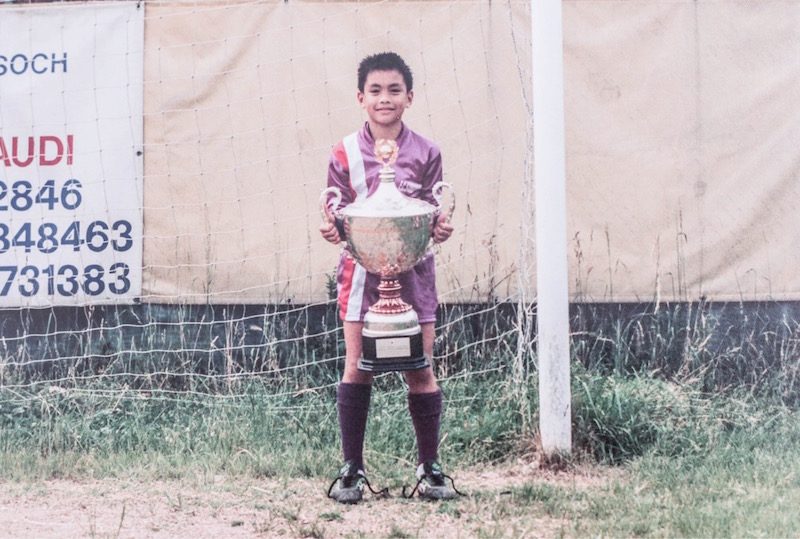SUMMARY
This is AI generated summarization, which may have errors. For context, always refer to the full article.


MANILA, Philippines – The best sportswriting often isn’t about the game itself but about those who play it. The same can be said about films that have athletes as their subject.
“Journeyman Finds Home: The Simone Rota Story,” directed by Albert Almendralejo and Maricel Cariaga, chronicles the fascinating life of 33-year old Simone Rota, the Davao Aguilas and Philippine Azkals defender.
The film is shot in the typical photojournalistic style of many documentarians today, with handheld cameras and sans a narrator. If you are familiar with Al Jazeera’s Witness documentaries then you will see the influence. It may not be an original treatment but it works in bringing an earthy, down-home flavor to the narrative.
We learn about Rota’s early life in interviews with his parents in Italy, about how a young truant, adopted as an infant from the Philippines, eventually chose football over a proper education, and bounced around the lower tiers of the Italian and Swiss football pyramids.
The story picks up steam when his interest about his place of birth is piqued and he travels to the Philippines in 2013. We see grainy YouTube footage of him performing in the United Football League for Stallion and eventually making the national team, interspersed with interviews from his teammates and coach Thomas Dooley.
As he succeeds on the pitch, the film takes us to the Buklod Kalinga orphanage, where Rota was entrusted to the care of an Italian nun as an infant in 1984. Rota decides to live and volunteer there, setting up a feeding program for the kids and serving as a loving older brother to other orphans like him.
Rota and Buklod Kalinga’s Sister Resmay Memorial then launch a search for his biological mother that takes them from Cavite to Cebu and Pampanga. The gut-wrenching traipse around the Philippines is one of the more dramatic passages in the film.
On the field Rota suffers one setback after another after a rib injury and an ACL tear sideline him for months. But the documentary ends with an inspiring flourish as he finds a new club with the Davao Aguilas and is once again selected by Dooley for the Azkals. (A brief stopover in Ceres Negros is passed over by the film.)
“Journeyman” is more about family than it is about football. Rota speaks movingly about how “you don’t need the same blood to be family” in the film.
Perhaps the most poignant moments of the documentary are when we see Rota with Chiara, a young orphan from Buklod Kalinga. Chiara’s parents, we are told, are known to the orphanage but are too poor to care for her, so Rota has filled in as the father figure. It’s not clear if Rota intends to legally adopt Chiara, who says in the film that Simone is her Dad. The man has come full circle.
Almendralejo took interest in Rota’s life story when the player was still with Stallion, and the story unfolded with more twists and turns after that, with his injuries and return to the national team.
This isn’t the first football-centered film by Almendralejo. He also produced the Little Azkals documentary that was directed by Baby Ruth Villarama and was released in 2014. Read Oggs Cruz’s review of that documentary on Rappler.
Cariaga, who is also the film’s cinematographer, wrote and directed the feature film Pitong Kabang Palay (7 Sacks of Rice) that was a finalist in the ToFarm film festival and won the Grand Prize (Golden Owl) award in the Aichi International Women’s Film Festival in Japan. Cariaga gift as a storyteller shines through in “Journeyman.”
If there are any quibbles, it’s perhaps a lack of depth in Rota’s persona as depicted. The film rarely ventures past the heroic facade of the footballer as star athlete and big-hearted volunteer. Perhaps some vanilla interviews with ex-teammates and coaches could have been excised and in their place more time plumbing the depths of Simone as a human being.
We get a hint of this when Simone talks about his adoptive sister Valentina, also a Filipina orphan, and her apparent disinterest in visiting the land of their birth. Details like this that could have enriched the storyline and made “Journeyman” make a forceful turn away from mere hagiography to true character study.
Thankfully the preview we saw last Sunday was an initial work-in-progress edit and Almendralejo says he will drop in about ten minutes more of footage. That might help the film level up in this respect.
This documentary has been submitted to the Metro Manila Film Festival. Almendralejo says we will know by October 15 if it makes the final roster. If not, a theatrical release in selected SM Cinemas will follow.
Don’t miss it. Rota’s story is an inspiring one, and any Filipino who has yearned for meaning and belonging will find resonance with it.
The movie is bookended by Rota’s voice enunciating his philosophy.
“Football is not only passion or the game. It’s about giving everything. It’s my life. You fight for your life.”
Follow Bob on Twitter @PassionateFanPH
–
Add a comment
How does this make you feel?
There are no comments yet. Add your comment to start the conversation.